Trở Về Trang Gốc Lịch Sử Việt Nam
Lịch Sử Việt Nam - phần 8
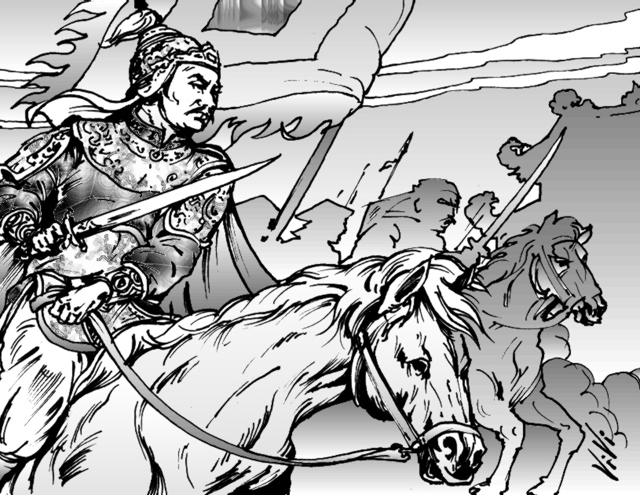
71. Đời vua Lê Chiêu Thống, đại tư đồ Nguyễn Hữu Chỉnh chuyên quyền làm điều trái phép. Nguyễn Huệ sai Vũ Văn Nhậm ra đánh Chỉnh. Sau Nguyễn Huệ thấy Vũ Văn Nhậm kiêu căng lại đem binh ra Bắc lần thứ 2 đánh Vũ Văn Nhậm.
In Le Chieu Thong’s reign, master Nguyen Huu Chinh abused the power to do illegal things. Nguyen Hue ordered Vu Van Nham lead troops to fight Chinh. Seeing that Vu Van Nham was arrogant, Nguyen Hue led troops to the North the second time to fight Vu Van Nham.
Sous le règne de Lê Chiêu Thông, le maître Nguyên Huu Chinh abusa du pouvoir pour faire des choses illégales. Nguyên Huê ordonna à Vu Van Nhâm de conduire des troupes pour combattre Chinh. Voyant que Vu Van Nhâm était arrogant, Nguyên Huê conduisit les troupes vers le nord la seconde fois pour combattre Vu Van Nhâm.
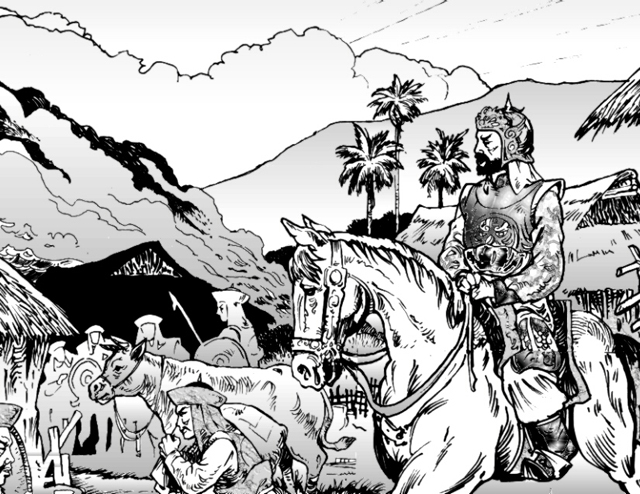
72. Cõng rắn cắn gà nhà: Vua Lê Chiêu Thống sợ hãi chạy qua Tàu cầu cứu. Vua Càn Long nhà Thanh sai Tôn Sĩ Nghị kéo 200 ngàn quân cùng với Hứa Thế Hanh, Sầm Nghi Đống sang đánh chiếm Thăng Long.
Inviting snake home to bite his own chicken: King Le Chieu Thong was panic-striken then ran to ask help from the Chinese. Emperor Can Long of Thanh dynasty ordered Ton Si Nghi, Hua The Hanh and Sam Nghi Dong led 200 thousand soldiers over to conquer Thang Long.
Ramener un serpent dans sa maison pour mordre son propre poulet: le roi Lê Chiêu Thông fut pris de panique et courut demander de l’aide aux chinois. L’empereur Càn Long de la dynastie Thanh ordonna à Tôn Si Nghi, Hua Thê Hanh et Sâm Nghi Dông de conduire 200000 soldats pour conquérir Thang Long.
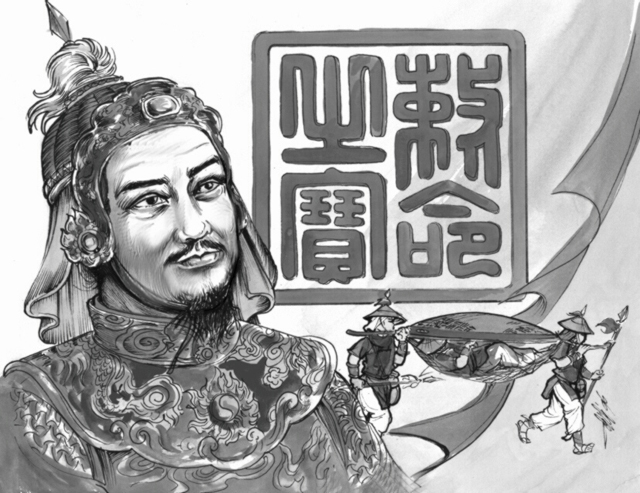
73. Vua Quang Trung đại phá quân Thanh: Vua Quang Trung Nguyễn Huệ lên ngôi hoàng đế rồi kéo đại quân ra Bắc. Vua cho quân ăn Tết trước rồi giữa đêm giao thừa chớp nhoáng tấn công giặc. Đêm mùng 3 Tết quân Tàu ở đồn Hà Hồi bị đánh quá rát phải ra đầu hàng.
Emperor Quang Trung defeated Thanh army: King Quang Trung Nguyen Hue took the throne then led his great troop to the North. The King let soldiers to celebrate early Tet then opened a lightning attack to the enemies in the Eve night. The third day of Tet, Chinese army in Ha Hoi fort was intensely attacked then surrendered.
L’empereur Quang Trung vainquit l'armée Thanh: le roi Quang Trung Nguyên Huê prit le trône et mena ensuite sa grande troupe vers le Nord. Le roi laissa ses soldats célébrer à l’avance le Têt puis déclencha une attaque éclair des ennemis dans la nuit à la veille du Têt. Le troisième jour du Têt, l'armée chinoise du fort Hà Hôi fut attaquée avec vigueur et se rendit.
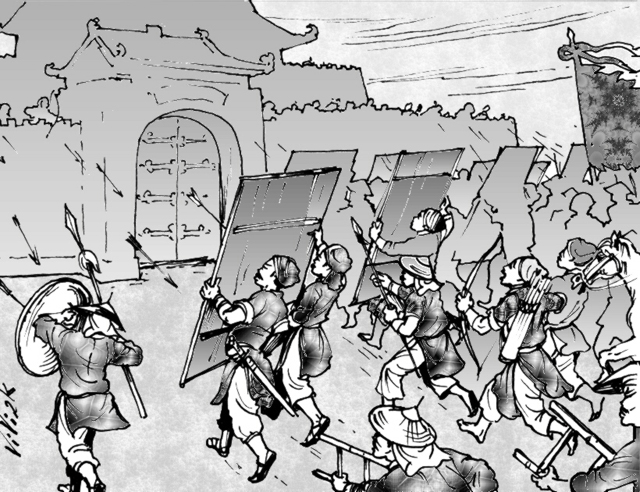
74. Trận Ngọc Hồi: Mùng 5 Tết quân ta đánh đồn Ngọc Hồi, súng bắn ra như mưa. Vua Quang Trung cho quân khỏe mạnh khiêng ván đi trước, bộ binh theo sau. Quân ta tràn vào đồn rút dao chém giặc chết ngổn ngang, máu chảy thành sông. Hứa Thế Hanh tử trận, Sầm Nghi Đống phải treo cổ chết.
The Ngoc Hoi battle: On the fifth day of Tet, Viet army attacked Ngoc Hoi fort; guns were fired continuously from the fort out. King Quang Trung ordered strong soldiers to carry wooden boards to advance first then infantries followed. The soldiers advanced into the fort and killed enemy with big knives. Enemy’s blood ran as a river. Hua The Hanh died in the battle. Sam Nghi Dong hung himself to death.
La bataille Ngoc Hôi: Le cinquième jour du Têt, l’armée Viêt attaqua le fort Ngoc Hôi ; les canons tiraient en permanence à partir du fort. Le roi Quang Trung ordonna aux soldats vigoureux de porter des planches de bois pour avancer en premier, puis l’infanterie suivit. Les soldats avancèrent dans le fort et tuèrent l'ennemi avec de grands couteaux. Le sang de l’ennemi s’écoula comme une rivière. Hua Thê Hanh mourut dans la bataille. Sâm Nghi Dông se pendit à mort.
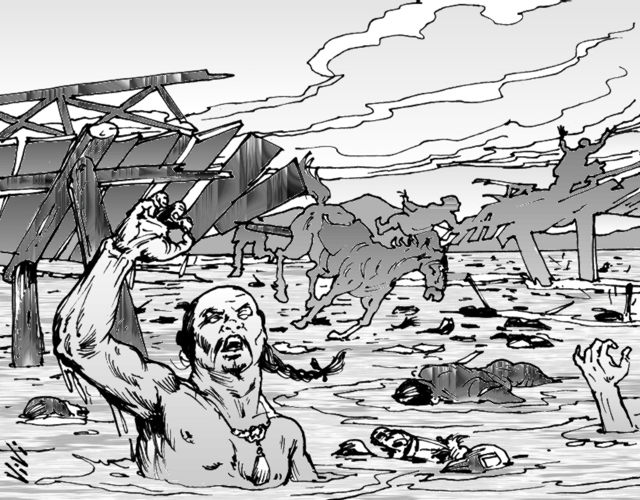
75. Tôn Sĩ Nghị đang ngủ say, nửa đêm nghe báo tin không kịp thắng yên ngựa, không mặc áo giáp bỏ đồn chạy. Quân Thanh thấy chủ tướng bỏ chạy, tranh nhau qua cầu Nhị Hà. Cầu đổ, quân Tàu té xuống sông chết đuối, thây nổi như rạ.
At night, Ton Si Nghi was heavily asleep when he received bad news. He hurrily ran away from the city, even forgot to wear his armor and put saddle on his horse. Seeing their general ran away, Thanh soldiers vied with each other to withdraw through Nhi Ha Bridge. The bridge broke, Thanh soldiers fell into the river and drowned. Their dead bodies were floating as stubble.
La nuit, Tôn Si Nghi était profondément endormi quand il reçut de mauvaises nouvelles. Il s'enfuit précipitamment de la ville, oubliant même de porter son armure et de seller son cheval. Voyant leur général s’enfuir, des soldats de Thanh rivalisèrent entre eux pour se retirer par le pont de Nhi Hà Le pont cassa et les soldats de Thanh tombèrent dans la rivière et s'y noyèrent. Leurs cadavres flottèrent comme du chaume.
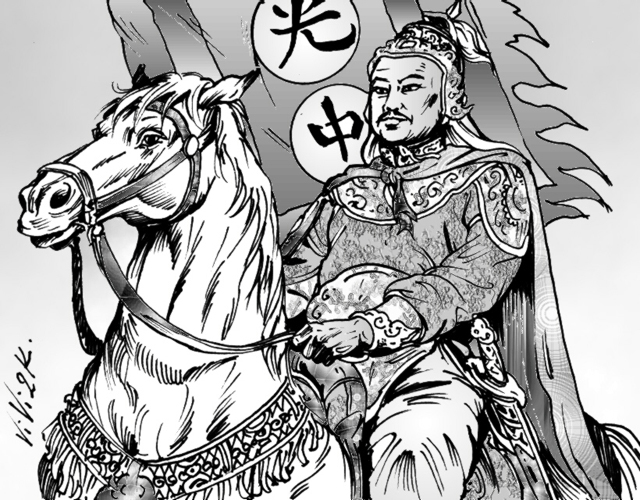
76. Vua Quang Trung là một ông vua anh dũng, có nhiều mưu lược và cũng là một ông vua có lòng độ lượng, am hiểu việc trị nước, biết trọng nhân tài. Ông cho sứ đi cầu phong với nhà Thanh để giữ hòa khí. Mặt khác ông cho huấn luyện quân sĩ, chuẩn bị đánh nước Tàu . Tiếc thay giấc mộng chưa thành thì ông chết sớm, hưởng thọ 40 tuổi.
King Quang Trung was not only brave and clever, but also generous and understanding in ruling the country and using talented people. On one hand, he sent messengers to Thanh to confer a title and to keep peace between two countries. On the other hand, he trained his army to be ready to attack China later. What a pity that he died at the age of 40 before he could carry out his dream.
Le roi Quang Trung ne fut pas seulement courageux et habile, mais aussi généreux et compréhensif dans le gouvernement du pays et dans l’utilisation de gens talentueux. D'une part, il envoya des messagers à Thanh pour lui conférer un titre et pour maintenir la paix entre les deux pays. D'autre part, il forma son armée pour être prêt à attaquer la Chine plus tard. Quel dommage qu’il mourut à l'âge de 40 ans avant d'avoir pu réaliser son rêve.
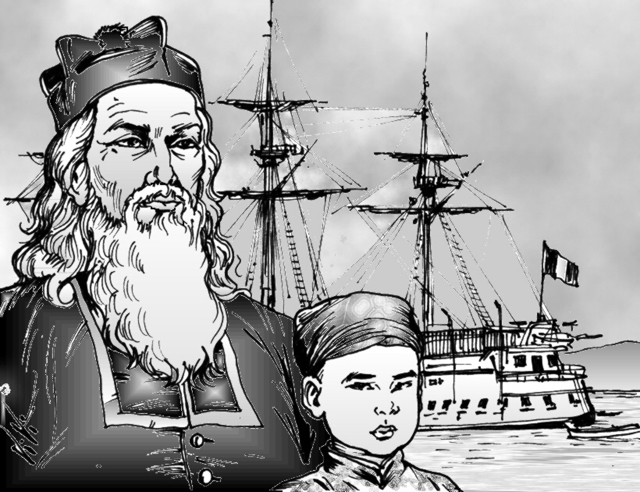
77. Giám mục Bá Đa Lộc mang hoàng tử Cảnh về Pháp mộ tàu chiến và quân đội qua giúp Nguyễn Ánh. Nguyễn Ánh mang quân đánh từ Nam ra nhiều lần chiếm được thành Qui Nhơn và thành Phú Xuân.
Bishop Alexander Rhodes went back France with prince Canh to get warships and army to help Nguyen Anh. From the south, Nguyen Anh brought his army towards north to attack many times, then seized Quy Nhon and Phu Xuan forts.L'évêque Alexandre de Rhodes retourna la France avec le prince Canh pour obtenir des navires de guerre et une armée pour aider Nguyên Anh. Venant du sud, Nguyên Anh mena son armée vers le nord, attaqua de nombreuses fois, puis s'empara des forts de Quy Nhon et Phu Xuân.
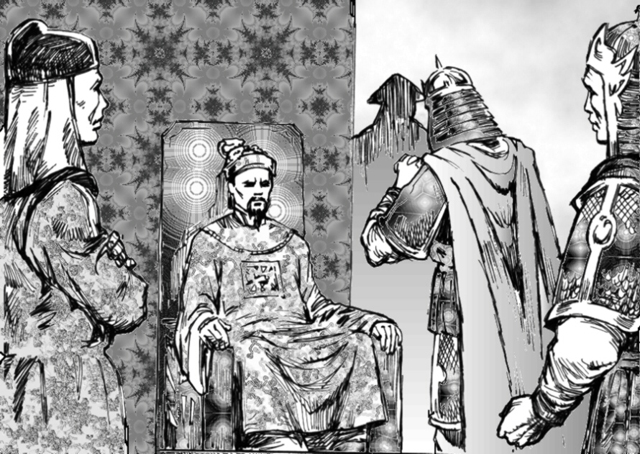
78. Trong khi các vua quan sau của nhà Tây Sơn càng ngày càng yếu kém, chúa Nguyễn càng ngày càng cường thịnh. Năm 1802, Nguyễn Ánh đánh thắng quân Tây Sơn gồm thâu cả nước.
The later kings and imperial officials of Tay Son reign were incapable, while Lord Nguyen reign was more and more settled and flourishing. In 1802, Nguyen Anh defeated Tay Son’s army to take over the whole country.Les derniers rois et fonctionnaires impériaux du règne de Tây Son furent des incapables, alors que le règne du seigneur Nguyên était de mieux en mieux assis et prospère. En 1802, Nguyên Anh vainquit l'armée de Tây Son pour prendre la possession de l'ensemble du pays.
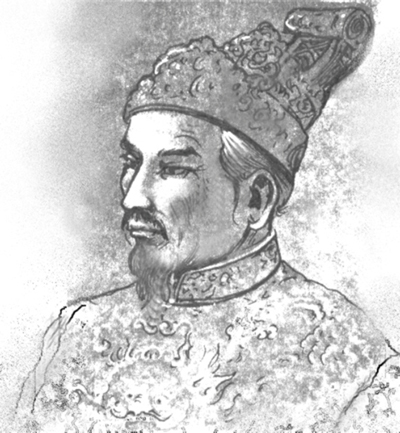
79. Nhà Nguyễn, 1802- 1945: Nguyễn Ánh lên ngôi xưng là vua Gia Long, đặt tên nước là Việt Nam, đóng đô ở Huế (Phú Xuân). Nhìn chung Nguyễn Ánh là người hẹp hòi, đã cho đào mả của Nguyễn Nhạc, Nguyễn Huệ vứt thây đi, và còn hành hạ, đánh giết tướng quân của Nguyễn Huệ. Mặt khác ông cũng giết hại công thần của chính ông. Tuy nhiên ông cũng có công trong việc khai khẩn miền Nam và cải tổ việc triều chính. Ông sai ông Nguyễn Văn Thành soạn bộ luật Gia Long gồm 22 quyển.
The Nguyen dynasty, 1802 - 1945: Nguyen Anh ascended the throne, proclaimed himself as King Gia Long, named the country Viet Nam, found Hue (Phu Xuan) as the capital. In general, Nguyen Anh was an ungenerous person, he ordered people to dig out the grave of Nguyen Nhac and the grave of Nguyen Hue to throw their corpses away. He also ordered people to torment and kill Nguyen Hue’s generals. He also killed his own meritorious officials. Anyhow, he also contributed in developing new lands in the South and reformed the imperial court affairs. He ordered Mr. Nguyen Van Thanh to write the Gia Long law, which had 22 books.
La dynastie des Nguyên, 1802 - 1945: Nguyên Anh monta sur le trône, se proclama le roi Gia Long, nomma le pays Viêt Nam, fonda Huê (Phu Xuân) comme capitale. En général, Nguyên Anh fut un homme peu généreux, il ordonna aux gens de creuser la tombe de Nguyên Nhac et la tombe de Nguyên Huê pour y jeter leurs corps. Il ordonna également aux gens de torturer et de tuer les généraux de Nguyên Huê. Il tua également ses propres fonctionnaires méritants. Quoi qu'il en soit, il contribua également au développement de nouvelles terres dans le Sud et réforma les affaires de la cour impériale. Il ordonna à M. Nguyên Van Thành d’écrire la loi de Gia Long, qui fut rédigée en 22 livres.
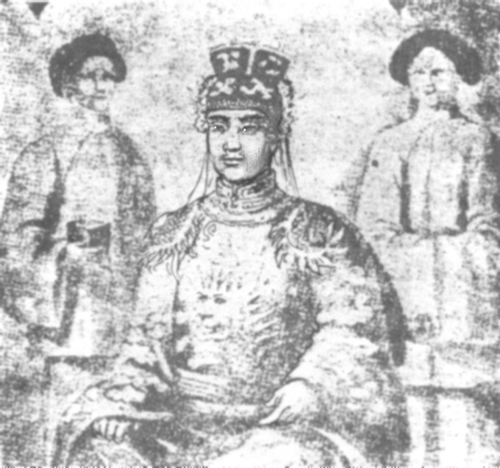
80. Năm 1820, vua Minh Mạng: Vua Minh Mạng là một ông vua siêng năng chăm lo việc nước và có nhiều cải cách. Ông đã đánh dẹp được nhiều giặc giã. Ông cũng cấm đạo Chúa, nhiều giáo sĩ và tín đồ bị giết.
Year 1820, King Minh Mang: King Minh Mang took well care of the country affairs and carried out many reforms. He put down many rising rebellions. He also suppressed Catholism and killed many priests and Catholics.
An 1820, le roi Minh Mang: le roi Minh Mang prit bien soin des affaires du pays et effectua de nombreuses réformes. Il mata de nombreux soulèvements. Il supprima également le Catholicisme et tua de nombreux prêtres et catholiques.
Trở Về Trang Gốc Lịch Sử Việt Nam